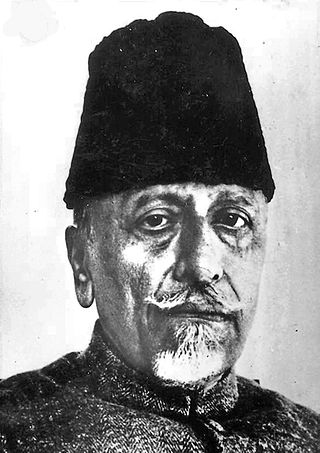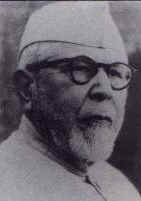Related Research Articles

Abul Kalam Ghulam Muhiyuddin Ahmed bin Khairuddin Al-Hussaini Azad ; 11 November 1888 – 22 February 1958) was an Indian independence activist, writer and a senior leader of the Indian National Congress. Following India's independence, he became the First Minister of Education in the Indian government. He is commonly remembered as Maulana Azad; the word Maulana is an honorific meaning 'Our Master' and he had adopted Azad (Free) as his pen name. His contribution to establishing the education foundation in India is recognised by celebrating his birthday as National Education Day across India.

Maulana Azad National Urdu University is a Central University located in the city of Hyderabad in the Indian state of Telangana. It was named after Maulana Abul Kalam Azad, India's first Minister of Education, a freedom fighter in India's struggle for independence, and a scholar of Islam and Urdu literature. It was the only Urdu university in India until the second university was built in the city of Kurnool, Andhra Pradesh in 2015.
The Sultan ul Madaris Urdu: سُلطان المدارس; is a Shia Islamic Madrasa for higher religious education in Lucknow, India. Major course of studies include Jurisprudence, Theology and Islamic Literature.
All India Shia Personal Law Board (AISPLB) is an organisation formed in January 2005 to represent the rights of Shia Muslims in India. It was felt that the current board, the All India Muslim Personal Law Board (AIMPLB) had been neglecting the views of Shia Muslims in India. Maulana Kalbe Sadiq, vice chairman of the Shia board is also senior vice president of All India Muslim Personal Law Board (AIMPLB).

Maulana Azad College is a public institute of liberal arts, commerce and science in India, located in central Kolkata, West Bengal, India. The college is fully government-administered. It is located near the junction of Rafi Ahmed Kidwai Road and SN Banerjee Road, popularly called "Lotus crossing".

Najma Akbar Ali Heptulla is an Indian politician. She was the Chancellor of Jamia Millia Islamia from 2017 to 2023, until Mufaddal Saifuddin was elected as new Chancellor on 14 March 2023. She was a six time member of the Rajya Sabha, the upper house of the Indian parliament, between 1980 and 2016, and Deputy Chairman of the Rajya Sabha for sixteen years when she was a member of Congress. Later she was nominated vice-president of Bharatiya Janata Party (BJP) in 2012, and was a minister from 2014-2016 as a member of BJP in Narendra Modi's first government. From 2016 to 2021, she served as the 16th Governor of Manipur.

Syed Shahnawaz Hussain is an Indian politician and a member of the Central Election Committee of Bharatiya Janata Party. He is one of the national spokespersons of Bharatiya Janata Party (BJP). Hussain was the Minister of Textiles and the Minister Civil Aviation in the Atal Bihari Vajpayee government. He has been the Minister of Industries of the Government of Bihar from 9 February 2021 to 9 August 2022.

Hakim Syed Zillur Rahman is an Indian scholar of Unani medicine. He founded Ibn Sina Academy of Medieval Medicine and Sciences in 2000. He had earlier served as Professor and chairman, Department of Ilmul Advia at the Ajmal Khan Tibbiya College, Aligarh Muslim University, Aligarh, for over 40 years before retiring as Dean Faculty of Unani Medicine. Presently, he is serving AMU as "Honorary Treasurer". In 2006, the Government of India awarded him the Padma Shri for his contribution to Unani Medicine.

The Maulana Abul Kalam Azad Institute of Asian Studies is an autonomous research institute based in Kolkata. It is funded by the Ministry of Culture of the Government of India. It was founded on 4 January 1993. The foundation stone of the institute was laid where the new building now stands on 12 March 1993. It is devoted to the study of the life and works of Maulana Abul Kalam Azad, the eminent nationalist leader and India's first education minister, after whom it is named, and to the furtherance of Area Studies, with special reference to South Asia, Central Asia and West Asia, especially dealing with social, cultural, economic, political and administrative developments in Asia from the nineteenth century to the present. M.Phil.- and Ph.D.-level students of the University of Calcutta, Jadavpur University and Jawaharlal Nehru University, New Delhi are also associated with it.

The Ministry of Minority Affairs is the ministry in the Government of India which was carved out of the Ministry of Social Justice and Empowerment and created on 29 January 2006. It is the apex body for the central government's regulatory and developmental programmes for the minority religious communities and minority linguistic communities in India, which include Muslims, Sikhs, Christians, Buddhists, Zoroastrians (Parsis) and Jains notified as minority religious communities in The Gazette of India under Section 2(c) of the National Commission for Minorities Act, 1992.

Abdul Majeed Khwaja was an Indian lawyer, educationist, social reformer and freedom fighter from Aligarh. In 1920, he along with others founded Jamia Millia Islamia and later served its vice chancellor and chancellor.
Akhtarul Wasey is an Indian scholar and academician, who serves as the president of Maulana Azad University, in Jodhpur, India. He formerly served as professor of Islamic Studies at Jamia Millia Islamia in New Delhi, where he remains professor emeritus in the Department of Islamic Studies.

Aligarh Muslim University Malappuram Centre Or AMU-Malappuram Campus is one of the prominent educational institution of Aligarh Muslim University in south India in the state of Kerala in Malappuram district near Perinthalmanna at Cherukara post. It was established in 2010 by the ministry of Human resource and Development, central government of India. The President of India in her capacity as the Visitor accorded sanction to establish two Centers of Aligarh Muslim University, one at Malappuram and the other at Murshidabad in 2010.

Aligarh Muslim University is a public central university in Aligarh, Uttar Pradesh, India, which was originally established by Sir Syed Ahmad Khan as the Muhammadan Anglo-Oriental College in 1875. Muhammadan Anglo-Oriental College became Aligarh Muslim University in 1920, following the Aligarh Muslim University Act. It has three off-campus centres in AMU Malappuram Campus (Kerala), AMU Murshidabad Centre, and Kishanganj Centre (Bihar).

Harish Chandra Verma, popularly known as HCV, is an Indian experimental physicist, author and emeritus professor of the Indian Institute of Technology Kanpur. In 2021, he was awarded the Padma Shri, the fourth highest civilian award, by the Government of India for his contribution to Physics Education. His field of research is nuclear physics.
The Aligarh Movement was the push to establish a modern system of Western-style scientific education for the Muslim population of British India, during the later decades of the 19th century. The movement's name derives from the fact that its core and origins lay in the city of Aligarh in Central India and, in particular, with the foundation of the Muhammadan Anglo-Oriental College in 1875. The founder of the oriental college, and the other educational institutions that developed from it, was Sir Syed Ahmed Khan. He became the leading light of the wider Aligarh Movement.
Syeda Saiyidain Hameed is an Indian social and women's rights activist, educationist, writer and a former member of the Planning Commission of India. She chaired the Steering Committee of the Commission on Health which reviewed the National Health Policy of 2002, till the dissolution of the body in 2015, to be replaced by NITI Aayog.

Shakir Ali Noorie is an Indian Sunni Muslim scholar, preacher and current President of Sunni Dawate Islami, a non-political, religious organisation in Mumbai, India. He adheres to the principles of Ahle Sunnat wa Jamaat (Barelvi) ideology.
References
- ↑ "Welcome to Maulana Azad Education Foundation". Archived from the original on 12 February 2014. Retrieved 31 January 2014.
- ↑ "Maulana Azad National Scholarship for Meritorious Girls student belonging to Minorities". megeducation.gov.in. Retrieved 21 February 2014.
- ↑ "Maulana Azad National Fellowship for Minority Students Scheme". minorityaffairs.gov.in. Archived from the original on 21 February 2014. Retrieved 21 February 2014.
- ↑ "Maulana Azad Education Foundation" (PDF). orissa.gov.in. Retrieved 21 February 2014.
- ↑ "Scholarships For Girls". Hindustan Times. Archived from the original on 13 March 2014. Retrieved 21 February 2014.
- ↑ "Welcome to Maulana Azad Education Foundation". Archived from the original on 27 December 2014. Retrieved 27 December 2014.
- ↑ "Centre orders closure of Maulana Azad Education Foundation". Hindustan Times. 28 February 2024. Retrieved 1 March 2024.